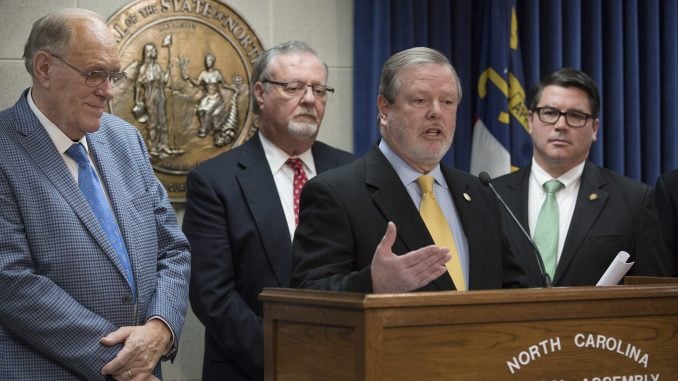
RALEIGH The North Carolina Senate passed a second reading of the $1 billion tax reduction proposal Tuesday that would cut individual and corporate tax rates, increase the standard deduction, replace non-refundable child tax credits with progressive tax deductions, and implement market-based-sourcing treatment of business revenues.Senate Bill 325 made its way through a senate committee last week in the shadow of H.B. 2 repeal efforts, but not with out debate over revenue impacts within the context of future spending obligations.”When I look at the impact it’s going to have on our finances…and while I understand what the goal is here it does concern me that we really have significant needs as a State,” said Sen. Floyd McKissick (D-Durham). “Our public schools are one of them and we have schools that are in deteriorating condition that we need to assist.”The fiscal impact is estimated to reduce revenues to the State by $323 million in the first year and over $700 million in the second year, as 99 percent of all tax payers will receive a tax cut or will not pay taxes at all.Part of the larger budget negotiations, but proceeding as a stand-alone bill, the tax proposal would take personal income tax rates from 5.499 percent down to 5.35 percent, the corporate income tax rates from 3.00 percent to 2.75 percent, and raise the standard deduction for a married couple filing jointly from $17,500 to $20,000 among other tax reforms.In response to revenue concerns, the bill supporters countered by pointing to recent revenue surpluses even as previous tax reductions were implemented.”When you make that statement it seems to me that you’re not considering the growth in our revenue and that has happened,” said primary sponsor Sen. Tommy Tucker (R-Union). “As you well know, we were in the hole when [Republicans] came in in 2011 and we’ve held the line on spending and we have decreased tax thus it’s created the surplus and that’s the business model.”As the bill came to the senate floor Tuesday Sen. Ben Clark (D-Cumberland) introduced an amendment to modify the proposal, arguing that it was unfair that higher income earners also benefited from a bill that purported to target the middle class by title. The amendment would have curtailed tax cuts for those earning more than $200,000, but was roundly rejected by the body.The partisan divide with respect to tax policy was in clear relief while the bill was debated Tuesday with Senators Andrew Brock (R-Davie) and Jerry Tillman (R-Randolph) describing the Republicans’ tax philosophy compared to McKissick’s calls for spending more in programs such as education.”When Republicans have a surplus we do two or three things: we give it back to the tax payers that we took too much from, we put it in savings, or we spend it on programs,” said Tillman. “You name another state..well there are not any, that have cut taxes to this extent and have budget surpluses in every category.”Brock added, succinctly, “It’s not your money to begin with; it belongs to the families and the businesses here in North Carolina.”Having passed its second reading the tax proposal will remain on the Senate calendar and is expected to be passed out to the House later this week.



